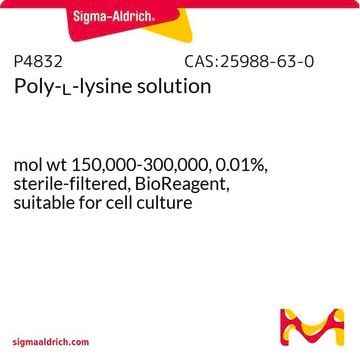P7890
Poly-L-lysine hydrobromide
mol wt 15,000-30,000 by viscosity
Synonym(s):
L-Lysine homopolymer hydrobromide
About This Item
Recommended Products
form
powder
Quality Level
mol wt
15,000-30,000 by viscosity
color
white to off-white
application(s)
cell analysis
storage temp.
−20°C
SMILES string
Cl.NCCCCC(N)C(O)=O
InChI
1S/C18H38N6O4/c19-10-4-1-7-13(22)16(25)23-14(8-2-5-11-20)17(26)24-15(18(27)28)9-3-6-12-21/h13-15H,1-12,19-22H2,(H,23,25)(H,24,26)(H,27,28)/t13-,14-,15-/m0/s1
InChI key
WBSCNDJQPKSPII-KKUMJFAQSA-N
Looking for similar products? Visit Product Comparison Guide
Application
Biochem/physiol Actions
Components
Caution
Preparation Note
Analysis Note
Storage Class Code
11 - Combustible Solids
WGK
WGK 3
Flash Point(F)
Not applicable
Flash Point(C)
Not applicable
Personal Protective Equipment
Choose from one of the most recent versions:
Certificates of Analysis (COA)
Don't see the Right Version?
If you require a particular version, you can look up a specific certificate by the Lot or Batch number.
Already Own This Product?
Find documentation for the products that you have recently purchased in the Document Library.
Customers Also Viewed
Our team of scientists has experience in all areas of research including Life Science, Material Science, Chemical Synthesis, Chromatography, Analytical and many others.
Contact Technical Service









